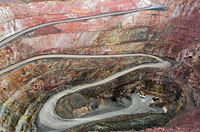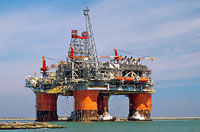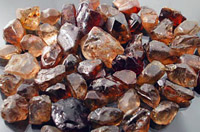
"... the greatest value is added by the geologist who starts with nothing other than some ideas and goes out into the desert and finds an orebody" 1 |
Introduction
Welcome to ESS 345. This class is an introduction to the geology of mineral and energy resources. It covers aspects of ore genesis, coal, oil and gas formation, non-metallic resources, geophysical and geochemical exploration, ore petrology, and some very basic resource economics. Examples will be drawn from major economic deposits around the world and where possible, from Washington and the western United States. For now this is a lecture and discussion class, though the homework and assignments will involve a bit of rock and mineral identification. Over the next few years I plan to extend it with a lab section and add a couple of credits, which will revive ESS 445. Stay tuned.
Coverage of resource geology and economics will be accompanied by discussion of topics such as recycling, renewable energy and mankind's recent impact on the carbon cycle. Industrial societies are ravenous consumers of minerals and energy. The past 10-15 years have seen enormous growth in resource exploitation driven by economic growth in China, India and Brazil (among others), and an accompanying rise in commodity prices. This has produced a lot of jobs for geologists. It has also been accompanied by a change in thinking about the responsibilities that go along with resource exploitation, both by governments and (many of) the companies involved. The class will touch on these issues as we go along.
Instructor
John Stone Office: 345 Johnson Hall Phone: 221-6332 stn@u etc
Prerequisites
The formal prerequisites for this class are ESS 210 or ESS 211. These are really leftovers from Eric Cheney's former version for non-majors. In future I'll be adjusting the content and level of the class to target ESS majors. For now (autumn 2013) it's open to all and the technical content will be developed and explained as needed. If you'd like to register but aren't sure if you know enough geology, contact the instructor to discuss it.
Class Timetable
Lecture 2:30 - 3:20 M W F 241 MGH (MGH? Where's that?) Textbooks and recommended reading
There are two textbooks listed for this class, though you really only need one or the other. They're quite different:
"Introduction to Ore Forming Processes" by Laurence Robb, published by Wiley. This one is quite technical, good for ESS majors who have completed the 200- and 300-level core curriculum. Buy this one if you're thinking of continuing in the field. This one focuses on metallic ore deposits, it's light on non-metals and does not cover coal, oil and natural gas.
"Economic Geology: Principles and Practice" by Walter L. Pohl, published by Wiley. This one is a much broader survey, but much less technical. Recommended for those taking the class more out of general interest - buy this one if you're starting out, or not taking the class to survey the field. This one covers energy as well as mineral resources, including non-metallics like clay, mineral sands and limestone. It also devotes a lot of space to exploration and mining practices - a general but comprehensive text.
For the part of the class focusing on metallic ore deposits an older but more advanced book is:The Geology of Ore Deposits by Guilbert and Park. This one presents a lot of the technical material in depth, along with a comprehensive collection of examples. If you're interested you might look for a cheaper used copy online at Powell's Books, ABE Books, Amazon or elsewhere. [No - sadly these are not sponsored links].
Syllabus
There is a timetable and summary of lecture topics in the 2013 introductory handout distributed in class on day 1. I'll supplement this with suggested reading topics and textbook chapters on the reading page as we progress.
For more details, figures and notes from lectures, see the lecture extras download page.
Assessment, tests and grading policyExams will cover material presented in lectures and labs. Exam questions will emphasize concepts and problem-solving rather than memorization. The final exam will be comprehensive, but it will deal mostly with material covered after the mid-term exam.
Commodity project 10% of your final grade Due Friday 4 Oct Commodity project 2 20% of your final grade Due Friday 15 Nov Deposit research project 20% of your final grade Due Friday 8 Nov Glossary definitions 20% of your final grade Due throughout Take-home exam 30% of your final grade



